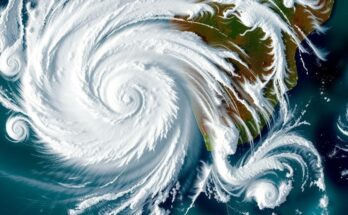Human-caused climate change has led to significant increases in rainfall and wind speeds associated with Hurricane Helene, with studies suggesting similar effects for Hurricane Milton. The links between climate change and storm intensity raise alarms for future extreme weather events and highlight the urgent need for improved emergency preparedness and action against climate change.
Recent studies indicate that human-induced climate change has significantly impacted Hurricane Helene, resulting in a 10% increase in its rainfall and an 11% increase in wind speeds. As Hurricane Milton approaches Florida, scientists warn that similar climate-driven enhancements may occur. Notably, the warming climate contributed to Helene’s wind speeds rising approximately 13 miles per hour (20.92 kilometers per hour) and made the ensuing high sea temperatures 200 to 500 times more probable. According to the World Weather Attribution (WWA), Gulf of Mexico ocean temperatures were approximately 3.6 degrees Fahrenheit (2 degrees Celsius) above the average. Ben Clarke, a climate researcher from Imperial College London and co-author of the study, noted, “Hurricane Helene and the storms that were happening in the region anyway have all been amplified by the fact that the air is warmer and can hold more moisture.” As scientists focus on Hurricane Milton, they correspondingly assess the potential ramifications of ongoing fossil fuel consumption. The consequences of climate change extend beyond coastal areas, as evidenced by the catastrophic inland flooding that claimed numerous lives during Helene. The hurricane struck Florida with unprecedented storm surges measuring 15 feet (4.57 meters) and sustained winds reaching 140 miles per hour (225.31 kilometers per hour), wreaking havoc across Georgia, the Carolinas, Tennessee, and Virginia. Hurricane Helene’s rainfall surpassed 40 trillion gallons, an extraordinary volume unfathomable without the influence of anthropogenic climate change. The WWA posits that the intensity witnessed would have significantly diminished in absence of human-induced warming. Ben Clarke further states, “When you start talking about the volumes involved, when you add even just a few percent on top of that, it makes it even much more destructive.” Research indicates that storms of Helene’s intensity, once expected every 130 years, are now 2.5 times more likely to occur in affected regions. The WWA, since its inception in 2015, has utilized rapid attribution studies to ascertain how extreme weather events can be linked to climate change. Although their findings are not peer-reviewed, they adopt peer-reviewed methods to analyze data and validate conclusions. A recent analysis from Lawrence Berkeley National Laboratory further emphasized that climate change has augmented rainfall in certain regions by as much as 50% and made it 20 times more likely in specific areas.
The relationship between climate change and natural disasters, particularly hurricanes, has garnered significant attention in scientific research. The World Weather Attribution (WWA) provides insight into the extent to which human activities contribute to the intensity and frequency of hurricanes. Past assessments have observed how higher sea temperatures, resulting from global warming, can intensify storms and lead to catastrophic flooding. Moreover, the recent occurrence of Hurricane Helene emphasizes the urgent implications of climate change, with discussions surrounding preparedness and resilience becoming increasingly pertinent as scientists warn of the growing threat posed by more extreme weather events caused by climate change.
The findings surrounding Hurricane Helene and the potential impact on Hurricane Milton underscore the urgent need for addressing climate change. The increased intensity and frequency of hurricanes are a direct consequence of anthropogenic actions, especially the burning of fossil fuels. As individual and collective efforts to mitigate these effects are critical, it is apparent that enhanced emergency preparedness and resilience planning are necessary to face future challenges. Notably, the trajectory of climate change and its associated risks will heavily depend on the choices made regarding energy systems and fossil fuel consumption moving forward.
Original Source: www.texomashomepage.com




